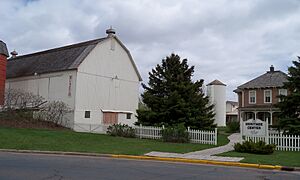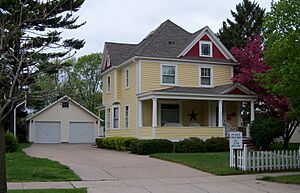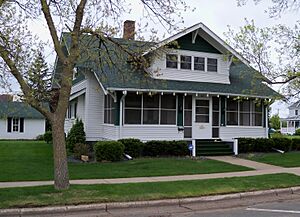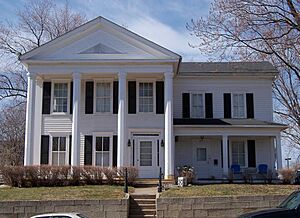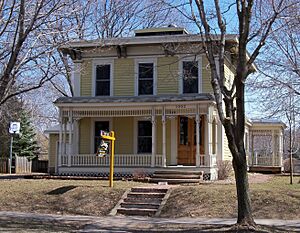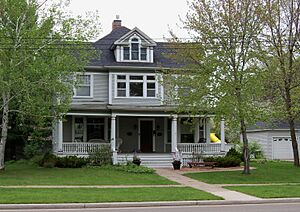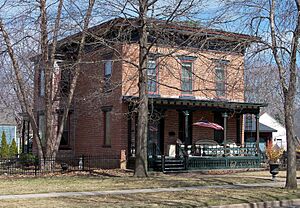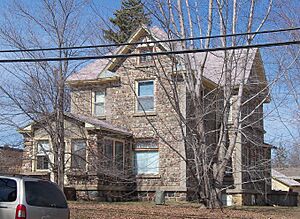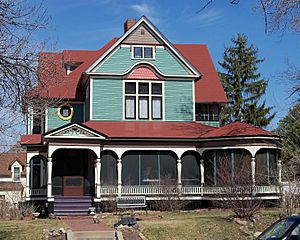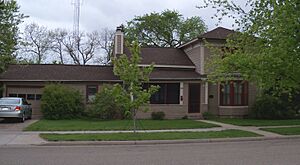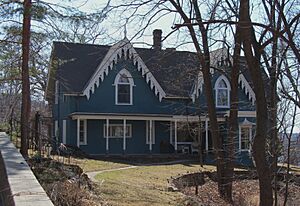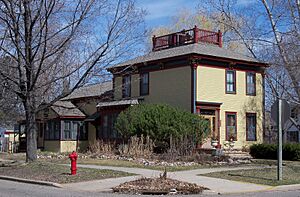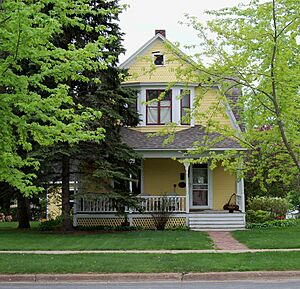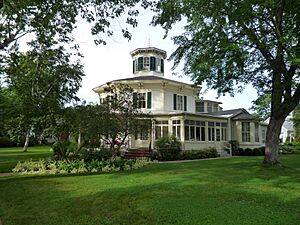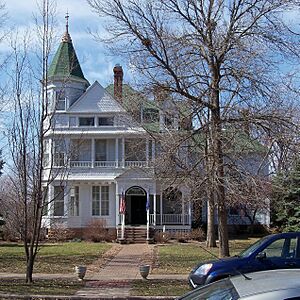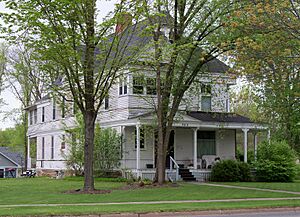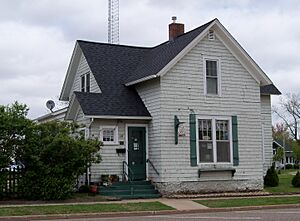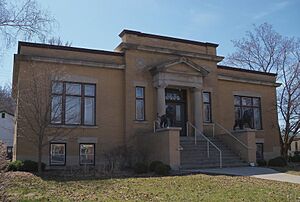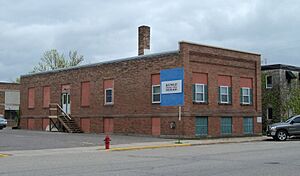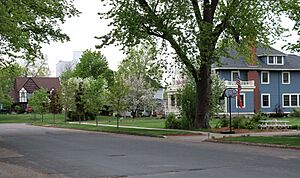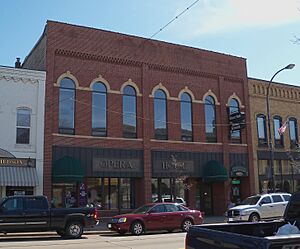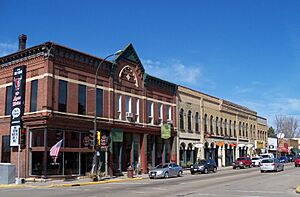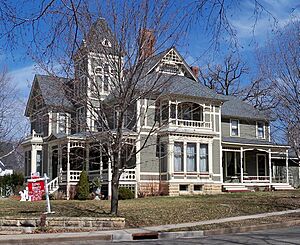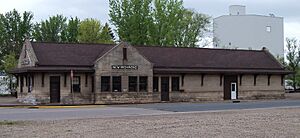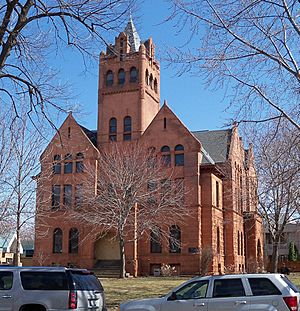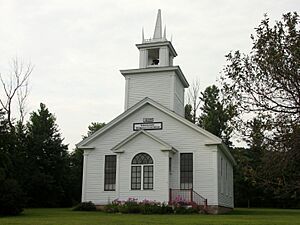National Register of Historic Places listings in St. Croix County, Wisconsin facts for kids
Welcome to St. Croix County, Wisconsin! This area is home to many cool old buildings and places that are super important to history. These special spots are listed on the National Register of Historic Places. Think of it like a Hall of Fame for buildings and areas that tell amazing stories about the past. There are 34 of these historic places in St. Croix County, and they include everything from old farmhouses to grand public buildings and even bridges! Let's explore some of them and see what makes them so special.
Contents
Historic Gems of St. Croix County
Homes with a Story
Many of the historic places in St. Croix County are old homes, each with its own unique style and history.
The Marcus Sears Bell Farm in New Richmond was built in 1884. It features an Italianate-style farmhouse, which looks like a fancy Italian villa. Marcus Bell was a farmer and a leader in his community. Today, this farm is part of the New Richmond Heritage Center, where you can learn more about local history.
In New Richmond, you'll find two William J. Bernd Houses. One, built in 1907, is a Princess Anne-style home, which was popular after the big tornado that hit New Richmond in 1899. The other, built between 1912 and 1927, is a well-kept bungalow, a cozy and practical house style. William Bernd was a successful farmer and real estate developer.
The Frederick L. Darling House in Hudson, built in 1857, is a fantastic example of Greek Revival architecture. This style makes buildings look like ancient Greek temples! Frederick Darling was a merchant, and his home is one of the best examples of this style in Hudson.
Another Hudson home, the William Dwelley House, was built in 1865 in the Italianate style. William Dwelley was an explorer and surveyor, and his house shows off the grand style of the time.
The Ezra Glover, Jr., House in New Richmond, built around 1900, is a Colonial Revival house. This style brings back classic American colonial looks. Interestingly, this house served as New Richmond's first hospital for over 20 years, starting in 1928!
In Hudson, the Herman L. Humphrey House is a two-story brick Italianate house from 1860. Herman Humphrey was a very important person, serving as a lawyer, judge, mayor, state representative, and even a U.S. Congressman!
The August Johnson House in Hudson, built in 1902, is a Queen Anne-style house. What makes it special is its exterior, made of cobblestone blocks cast in concrete. August Johnson himself was a mason, so he knew how to work with stone!
The Dr. Samuel C. Johnson House in Hudson, built in 1884, is another Queen Anne-style home. Dr. Johnson was a surgeon who fought in the Battle of Shiloh during the Civil War. He also directed a local sanatorium and served as Hudson's mayor and Wisconsin's surgeon general.
The William H. Kell House in New Richmond, likely built in 1875, is an Italianate-style house covered in clapboard and wood shingles. It's a great example of homes from that era.
The Lewis-Williams House in Hudson, built in 1860, is a Gothic Revival house with a stucco exterior. A doctor named Boyd T. Williams, who was a cancer researcher, even ran a sanatorium in this house!
The Samuel T. Merritt House in Hudson is a two-story Italianate house built in 1867. Samuel Merritt was an early settler who is said to have been the first to ship wheat down the river from this area.
The Joseph Mielke House in New Richmond, built around 1900, is considered the best example of a Dutch Colonial Revival home in the city. This style often features a distinctive gambrel roof.
The John S. Moffat House in Hudson is a very unusual Octagon house built in 1854. It was first in the Greek Revival style and later changed to Italianate. John Moffat was a judge, and his house is now the museum for the St. Croix County Historical Society!
The William H. Phipps House in Hudson, built in 1884, is considered Hudson's finest Queen Anne home. It has a cool three-story octagonal tower! William Phipps was an important railway executive and a generous person who gave back to his community.
The Erick J. Thompson House in New Richmond, built in 1893, is a 2.5-story Queen Anne house with a matching carriage house. It's a great example of this popular late 19th-century style.
Important Buildings and Districts
Beyond individual homes, St. Croix County has other significant structures and even entire historic neighborhoods.
The Chicago, St. Paul, Minneapolis and Omaha Railroad Car Shop Historic District in North Hudson includes several buildings from the railroad, like car shops and paint shops, built between 1890 and 1916. These buildings show the importance of the railway in the area's history.
The Dr. Frank W. Epley Office in New Richmond, built in 1883, belonged to a doctor who was also a mayor and helped start power and phone companies. His office was damaged in the 1899 tornado, but he bravely salvaged supplies and helped lead the town's recovery.
The First English Lutheran Church in New Richmond was built in 1906 in the Gothic Revival style by Swedish Lutherans. Early services were held in both Swedish and English!
The Hudson Public Library is a beautiful Carnegie library designed in the Neoclassical style and opened in 1904. Carnegie libraries were built all over the country with money from businessman Andrew Carnegie, who believed in the power of public libraries.
The New Richmond News Building is a two-story brick office building from 1913. It housed the local newspaper, which started way back in 1869 and has been telling the town's stories for over a century!
The New Richmond Roller Mills Co. complex includes a concrete grain elevator and mill built in 1916. This site has been used for milling grain since 1867, showing the area's agricultural roots.
The New Richmond West Side Historic District is a whole neighborhood with 28 historic buildings! They range in style from Italianate to Shingle-style and Colonial Revival, built between 1873 and 1929. It's like walking through a living museum of architecture.
The Opera Hall Block in Hudson is a theater built in 1880. Imagine all the shows and events that have taken place there over the years!
The Second Street Commercial District in Hudson includes 22 buildings that make up the heart of downtown. Many of these were built after a big fire in 1866, with fireproof exteriors to protect them.
The Sixth Street Historic District in Hudson is a fancy residential neighborhood. It features homes in various styles, including Greek Revival, Gothic Revival, Italianate, Queen Anne, and bungalows. It's a great place to see different architectural trends from the past.
The Soo Line Depot in New Richmond is a stone-clad train station built in 1915. It served passengers until 1968, connecting New Richmond to other towns by rail.
The St. Croix County Courthouse in Hudson is a massive red sandstone and brick building designed in the Richardsonian Romanesque style and built in 1910. Courthouses are often grand buildings because they represent justice and government.
Farms and Bridges
St. Croix County also has historic farms and impressive bridges.
The Kinnickinnic Church, built in 1868 in the Greek Revival style, is located in Kinnickinnic. Methodists and Congregationalists used to share the church, worshiping on alternate Sundays. It was used as a church until 1951 and is now a museum.
The Louis C. and Augusta Kriesel Farmstead in St. Joseph was built between 1900 and 1910. It includes many farm buildings like a farmhouse, barn, silo, and even a smokehouse, showing how farms operated over a century ago.
The Lewis Farmhouse in Boardman, also known as Willow River Farm, is a gabled ell farmhouse built in 1867. It represents the early farming history of the area.
The Soo Line High Bridge near Somerset is a dramatic steel arch bridge built between 1910 and 1911. It's super long (about 2,600 feet!) and very high (184 feet!). It's known for its beauty and clever engineering.
The Stillwater Bridge over the St. Croix River, built in 1931, is a rare example of a vertical-lift highway bridge. This type of bridge can be lifted straight up to let tall boats pass underneath. It connects Wisconsin to Minnesota.
The John Nicholas and Hermina Thelen House in St. Joseph is a farmstead that shows the change from wheat farming to dairy farming. It includes an Italianate farmhouse from 1885, a stone smokehouse from 1873, a granary from 1873, and a barn and silo from 1917. This farm tells the story of how agriculture changed over time.
Former Listings
Sometimes, a historic property might be removed from the National Register. One such property was the T.E. Williams Block in Hudson. This commercial building, built in the Italianate style with a limestone front, was listed in 1984 but later removed in 2009.



